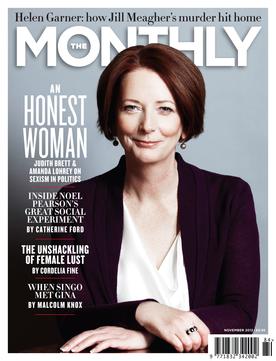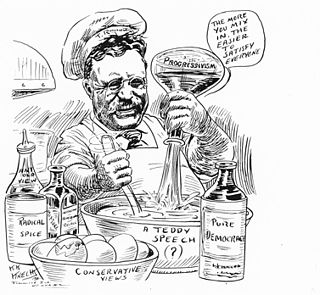Conservatism is a cultural, social, and political philosophy and ideology, which seeks to promote and preserve traditional institutions, customs, and values. The central tenets of conservatism may vary in relation to the culture and civilization in which it appears. In Western culture, depending on the particular nation, conservatives seek to promote and preserve a range of institutions, such as the nuclear family, organised religion, the military, the nation-state, property rights, rule of law, aristocracy, and monarchy. Conservatives tend to favour institutions and practices that enhance social order and historical continuity.

Thatcherism is a form of British conservative ideology named after Conservative Party leader Margaret Thatcher that relates to not just her political platform and particular policies but also her personal character and style of management while in office. Proponents of Thatcherism are referred to as Thatcherites. The term has been used to describe the principles of the British government under Thatcher from the 1979 general election to her resignation in 1990, but it also receives use in describing administrative efforts continuing into the Conservative governments under John Major and David Cameron throughout the 1990s and 2010s. In international terms, Thatcherites have been described as a part of the general socio-economic movement known as neoliberalism, with different countries besides the United Kingdom sharing similar policies around expansionary capitalism.
One-nation conservatism, also known as one-nationism or Tory democracy, is a paternalistic form of British political conservatism. It advocates the preservation of established institutions and traditional principles within a political democracy, in combination with social and economic programmes designed to benefit the ordinary person. According to this political philosophy, society should be allowed to develop in an organic way, rather than being engineered. It argues that members of society have obligations towards each other and particularly emphasises paternalism, meaning that those who are privileged and wealthy should pass on their benefits. It argues that this elite should work to reconcile the interests of all social classes, including labour and management, rather than identifying the good of society solely with the interests of the business class.
Samuel Todd Francis, known as Sam Francis, was an American white supremacist writer. He was a columnist and editor for the conservative Washington Times until he was dismissed after making racist remarks at the 1995 American Renaissance conference. Francis would later become a "dominant force" on the Council of Conservative Citizens, a white supremacist organization identified as a hate group by the Southern Poverty Law Center. Francis was chief editor of the council's newsletter, Citizens Informer, until his death in 2005. White supremacist Jared Taylor called Francis "the premier philosopher of white racial consciousness of our time."
A Red Tory is an adherent of a centre-right or paternalistic-conservative political philosophy derived from the Tory tradition, most predominantly in Canada but also in the United Kingdom where it is more commonly known as one nation conservatism. This philosophy tends to favour communitarian social policies, while maintaining a degree of fiscal discipline and a respect of social and political order. It is contrasted with "Blue Tory" or "High Tory". Some Red Tories view themselves as small-c conservatives.
Liberal conservatism is a political ideology combining conservative policies with liberal stances, especially on economic issues but also on social and ethical matters, representing a brand of political conservatism strongly influenced by liberalism.

David Ewan Marr FAHA is an Australian journalist, author, and progressive political and social commentator. His areas of expertise include the law, Australian politics, censorship, the media, and the arts. He writes for The Monthly, The Saturday Paper, and Guardian Australia.
Conservatism in Canada is generally considered a movement which is primarily represented by the modern-day Conservative Party of Canada in federal party politics, as well as various centre-right and right-wing parties at the provincial level. Far-right politics have never been a prominent force in Canadian society. The first party which called itself "Conservative" in what would become Canada was elected in the Province of Canada election of 1854.
Black conservatism is a political and social philosophy rooted in communities of African descent that aligns largely with the conservative ideology around the world. Black conservatives emphasize traditionalism, patriotism, self-sufficiency, and strong cultural and social conservatism within the context of the black church. In the United States it is often, but not exclusively, associated with the Republican Party.
These are the references for further information regarding the history of the Republican Party in the U.S. since 1854.
Modern liberalism in the United States is based on the combined ideas of civil liberty and equality with support for social justice. It is one of two major political ideologies of the United States. Economically, modern liberalism supports government regulation on private industry, opposes corporate monopolies, and supports labor rights. Its fiscal policy opposes any reduction in spending on the social safety net, while simultaneously promoting income-proportional tax reform policies to reduce deficits. It calls for active government involvement in other social and economic matters such as: reducing economic inequality, increasing diversity, expanding access to education and healthcare, regulating economic activity, and environmentalism. Modern liberalism is a large and mainstream ideology in the Democratic Party and nation. Modern liberalism was formed in the 20th century in response to the Great Depression. Major examples of modern liberal policy programs include the New Deal, the Fair Deal, the New Frontier, the Great Society, the Affordable Care Act, and the Infrastructure Investment and Jobs Act.

The Monthly is an Australian national magazine of politics, society and the arts, which is published eleven times per year on a monthly basis except the December/January issue. Founded in 2005, it is published by Melbourne property developer Morry Schwartz.

American political ideologies conventionally align with the left–right political spectrum, with most Americans identifying as conservative, liberal, or moderate. Contemporary American conservatism includes social conservatism and fiscal conservatism. The former ideology developed as a response to communism and the civil rights movement, while the latter developed as a response to the New Deal. Contemporary American liberalism includes social liberalism and progressivism, developing during the Progressive Era and the Great Depression. Besides conservatism and liberalism, the United States has a notable libertarian movement, developing during the mid-20th century as a revival of classical liberalism. Historical political movements in the United States have been shaped by ideologies as varied as republicanism, populism, separatism, fascism, socialism, monarchism, and nationalism.
Conservatism in Australia refers to the political philosophy of conservatism as it has developed in Australia. Politics in Australia has, since at least the 1910s, been most predominantly a contest between the Australian labour movement and the combined forces of anti-Labour groups. The anti-Labour groups have at times identified themselves as "free trade", "nationalist", "anti-communist", "liberal", and "right of centre", among other labels; until the 1990s, the label "conservative" had rarely been used in Australia, and when used it tended to be used by pro-Labour forces as a term of disparagement against their opponents. Electorally, conservatism has been the most successful political brand in Australian history.
Green conservatism is a combination of conservatism with environmentalism. Environmental concern has been voiced by both conservative politicians and philosophers throughout the history of conservatism. One of the of most prominent early philosophers of conservatism, Edmund Burke, in his Reflections on the Revolution in France (1790), quoted as saying: "The earth, the kind and equal mother of all ought not to be monopolised to foster the pride and luxury of any men."

Theodore Roosevelt (1858–1919) was the 26th President of the United States (1901–1909) and also served as Governor of New York and Vice President. He is known for becoming a leading spokesman for his version of progressivism after 1890. However, author Daniel Ruddy argues in his book Theodore the Great: Conservative Crusader that Roosevelt was actually a "populist conservative" and a "Hamiltonian"—a conservative in the eighteenth century sense of the word. Similarly, Francis Fukuyama identifies Roosevelt, together with Alexander Hamilton, as part of a tradition of a strong-state conservatism in the United States.
Conservatism in the United Kingdom is related to its counterparts in other Western nations, but has a distinct tradition and has encompassed a wide range of theories over the decades of conservatism. The Conservative Party, which forms the mainstream right-wing party in Britain, has developed many different internal factions and ideologies.
This is a selective bibliography of conservatism in the United States covering the key political, intellectual and organizational themes that are dealt with in Conservatism in the United States. Google Scholar produces a listing of 93,000 scholarly books and articles on "American Conservatism" published since 2000. The titles below are found in the recommended further reading sections of the books and articles cited under "Surveys" and "Historiography." The "Historiography" and "Critical views" section mostly comprise items critical or hostile of American conservatism.
Progressive conservatism is a political ideology that attempts to combine conservative and progressive policies. While still supportive of capitalist economy, it stresses the importance of government intervention in order to improve human and environmental conditions.
There has never been a national political party in the United States called the Conservative Party. All major American political parties support republicanism and the basic classical liberal ideals on which the country was founded in 1776, emphasizing liberty, the pursuit of happiness, the rule of law, the consent of the governed, opposition to aristocracy and fear of corruption, coupled with equal rights before the law. Political divisions inside the United States often seemed minor or trivial to Europeans, where the divide between the Left and the Right led to violent political polarization, starting with the French Revolution.





